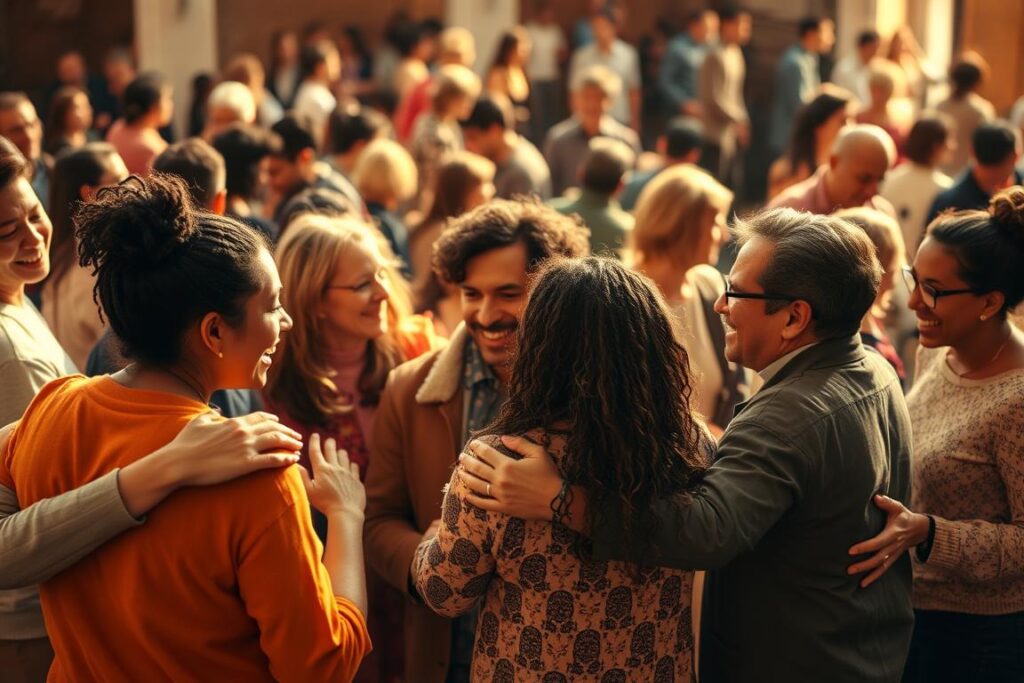What if the key to a fulfilling life is not in big gestures? But in the small, everyday moments of connection and romance we often miss?
As we explore relationships and dating, we seek a deeper understanding of what makes life meaningful. The quest for happiness and purpose is something we all share.
By looking into the details of love and its role in our lives, we can find the secrets to a life full of joy and fulfillment. We learn how love affects our well-being and relationships.
Key Takeaways
- Understanding the importance of love in achieving a meaningful life.
- Practical tips for nurturing relationships and romance.
- The role of love in personal growth and happiness.
- Strategies for cultivating love and connection in daily life.
- Insights into the complexities of dating and relationships.
What is Love? Understanding Its Different Dimensions
Love is more than just a feeling; it’s a complex mix of emotions. It includes romantic, familial, and platonic love. Knowing these types helps us connect deeper with others.
Exploring love’s many forms gives us insights into its impact on our lives and those around us.
Romantic Love
Romantic love is filled with passion and closeness. It’s the heart of many fairy tales and the base of our biggest relationships. Romantic love is about a deep emotional bond with someone, wanting to be close and committed.
Familial Love
Familial love is about family ties. It’s unconditional and gives us a sense of belonging and safety. This love isn’t just for immediate family. It also includes extended family, creating a wider sense of community.
Platonic Love
Platonic love is about deep friendships. It’s built on respect, trust, and affection without romance or sex. Platonic love is vital for our emotional health, giving us support and friendship in life.
To understand love better, let’s look at what makes each type special:
- Romantic love: Passion, intimacy, commitment
- Familial love: Unconditional acceptance, loyalty, family bonds
- Platonic love: Mutual respect, trust, deep affection
By grasping the different aspects of love, we can build more meaningful relationships. Each type of love has its own role in our lives and connections.
The Science Behind Love: How It Affects Us
Learning about the science of love can give us deep insights into its effects on our happiness and relationships. Love is a complex thing that touches us in many ways.
Psychological Impacts
Love deeply affects our mental health. It makes us feel happier and more affectionate, lowering stress and anxiety. Feeling loved and supported boosts our mental health, making us feel secure and close in our relationships.
The effects of love on our minds are wide-ranging. It makes us more emotionally strong, helping us deal with life’s ups and downs better. Love also shapes how we connect with others, influencing our attachment styles.
Biological Responses
Biologically, love sets off the release of important chemicals and hormones. These substances are key to our emotional and physical health. Oxytocin, known as the “love hormone,” is released during touch and intimacy, strengthening our bond.
Other chemicals, like dopamine and serotonin, also play a part in love. Dopamine is linked to pleasure, while serotonin helps control our mood. The mix of these chemicals greatly influences our feelings and health.
By grasping the biological side of love, we can see its big impact on our lives and bonds. This knowledge helps us build healthier, more rewarding relationships.
The Role of Love in Building Strong Relationships
Love is key in making and keeping strong, healthy relationships. It’s the base for trust, communication, and respect. In romance and dating, love brings people together and helps them face life’s ups and downs.
Talking well is vital in any relationship. It’s not just about speaking, but also listening and getting each other. When we talk and listen well, trust grows. This trust is essential for a good relationship. Knowing each other’s love language helps us share our needs better, making our bond stronger. For more tips on keeping relationships alive, check out ProsperGlow’s guide.
Communication and Trust
Trust is the heart of any successful relationship. It grows when partners are reliable, honest, and open. Trust makes us feel safe, letting us share our thoughts and feelings freely with our partner.
| Aspect | Importance in Relationships | Impact on Love |
|---|---|---|
| Communication | High | Fosters understanding and intimacy |
| Trust | Crucial | Builds security and reliability |
| Conflict Resolution | Essential | Strengthens bond through challenges |
Conflict Resolution Strategies
Every relationship faces conflicts. But how we solve these issues matters. Good conflict resolution means listening well, being empathetic, and willing to compromise. By solving problems together, couples can grow closer and understand each other better.
Some key strategies for solving conflicts include:
- Staying calm during disagreements
- Listening carefully to your partner’s view
- Working together to find a solution, not blaming

In conclusion, love is the base of strong, healthy relationships. By focusing on good communication, building trust, and solving problems well, couples can grow their love. As we explore relationships, dating, and romance, understanding love’s role is key to lasting connections.
How Love Influences Our Mental Health
Love deeply affects our mental health, boosting our happiness and strength. It shapes our emotional and psychological well-being in many ways. By understanding this, we see why love and positive relationships are key to our well-being.
Love and Happiness
Love greatly contributes to our happiness. Whether it’s romantic, familial, or platonic, it brings joy and satisfaction. This improves our mental health.
Studies show that those in loving relationships have less stress and anxiety. Love gives us a sense of security and support. This helps us face life’s challenges better. For example, a study on growing together as a couple shows love’s role in mental well-being.
Love as a Healing Force
Love also heals us, helping us through tough times. The emotional support from loving relationships helps us recover from depression and anxiety. Practicing self-love and self-care boosts our resilience, helping us deal with stress and adversity.
Unconditional love, whether from ourselves or others, boosts our self-worth. It’s very helpful for those facing mental health issues. It promotes a positive self-image and encourages growth.
| Aspect of Mental Health | Impact of Love |
|---|---|
| Happiness | Increases feelings of joy and satisfaction |
| Stress and Anxiety | Provides a sense of security and support, reducing stress and anxiety |
| Resilience | Enhances ability to cope with challenges through emotional support and self-love |
Love Languages: The Key to Understanding Each Other
Understanding love languages can change how we connect with each other. They help us share our emotional needs and desires in relationships.
Knowing our primary love language helps us understand ourselves and our partners better. This idea has changed how we view relationships. It shows the value of emotional intelligence and clear communication.
The Five Love Languages Explained
The five love languages are: Words of Affirmation, Acts of Service, Receiving Gifts, Quality Time, and Physical Touch. Each one is special and meets different emotional needs in relationships.
- Words of Affirmation: Verbal expressions of appreciation and encouragement.
- Acts of Service: Showing love through actions, like helping with chores.
- Receiving Gifts: Showing love and care through gifts.
- Quality Time: Spending quality time together, giving each other undivided attention.
- Physical Touch: Expressing love through physical contact, like holding hands or intimate touch.
Identifying Your Love Language
Figuring out your love language means understanding how you give and receive love. Think about what makes you feel most loved and appreciated. This self-awareness can make your partnership deeper and more meaningful.
By knowing and speaking each other’s love languages, we can make our relationships stronger. We build better bonds and a more fulfilling partnership.
Cultivating Self-Love: A Foundation for Healthy Relationships
Starting a journey to healthy relationships means first loving yourself. It’s key to develop positive bonds with others. When we love ourselves, we attract people who do the same.
Self-love isn’t selfish; it’s about valuing ourselves. It’s about taking care of our emotional and mental health. By focusing on self-care, we build a strong base for good relationships.
Importance of Self-Care
Self-care is a big part of self-love. It’s about actively caring for our health. This improves our well-being and helps us see ourselves in a better light.
- Engaging in regular exercise to boost our mood and energy levels
- Practicing mindfulness and meditation to reduce stress and increase self-awareness
- Connecting with nature to feel grounded and inspired
Adding these self-care habits to our lives boosts our self-love. It also makes our life better overall.
| Self-Care Activity | Benefits |
|---|---|
| Regular Exercise | Boosts mood, increases energy, improves physical health |
| Mindfulness and Meditation | Reduces stress, increases self-awareness, enhances emotional regulation |
| Connecting with Nature | Grounds and inspires, improves mental clarity, reduces feelings of isolation |
Overcoming Self-Criticism
Self-criticism is a big obstacle to self-love. We often judge ourselves harshly. To beat this, we need to be kinder to ourselves and stop negative self-talk.
Being kind to ourselves helps us focus on our strengths. It’s okay to make mistakes. We’re all human.
As we grow in self-love, we become more confident and resilient. We’re better at facing life’s challenges and building strong relationships. By putting our emotional well-being first, we lead a more fulfilling and loving life.
Love in the Digital Age: Navigating Online Relationships
Technology has changed how we find and keep love. Dating apps and social media make it easy to meet people. But, they also bring their own set of problems.
Dating apps have changed the game. They let us swipe through profiles and start chats with a few taps. It’s a new way to meet and talk to others.
Dating Apps and Their Impact
Dating apps let us meet people we wouldn’t have met before. But, they also make us worry about our emotional health. The quality of our online connections is a big concern.
| Aspect | Positive Impact | Negative Impact |
|---|---|---|
| Accessibility | Increased opportunities to meet new people | Overabundance of choices can lead to decision paralysis |
| Communication | Easier to initiate conversations | Risk of miscommunication due to lack of non-verbal cues |
| Emotional Well-being | Potential for meaningful connections | Exposure to rejection and disappointment |
Maintaining Connection Virtually
Keeping a connection online takes work. It’s key to be emotionally smart and communicate well. This helps build strong relationships online.
Here are some tips for staying connected online:
- Regularly schedule video calls for face-to-face time
- Do things together online to feel closer
- Be open and honest to build trust
Understanding how tech affects our love lives is important. We must face the challenges and seize the opportunities of the digital age. As we grow, keeping love and relationships meaningful is essential.
The Impact of Love on Personal Growth
Love changes us in deep ways, helping us grow and improve. It can make us better in ways we never thought possible.
Love motivates us to take risks and chase our dreams. Feeling loved and supported makes us more confident. For example, hobbies and interests can help us grow, and love supports us in this journey.
Love as a Motivator
Being in love makes us feel seen and valued. This inspires us to be our best selves. Love motivates us to achieve great things in our careers and personal lives.
Love also pushes us to try new things. It gives us a safe space to learn from our mistakes. This helps us become more confident and resilient.
Building Resilience Through Love
Love helps us deal with tough times. The support of loved ones makes a big difference. Love’s emotional support helps us get through hard times.
Love teaches us important skills like empathy and patience. These skills help us grow into compassionate and well-rounded people.
In summary, love deeply impacts our personal growth. It motivates us and builds our resilience. By embracing love, we become more positive and fulfilled.
Love and Community: Strengthening Social Bonds
Love plays a big role in our lives, but we often forget its impact on our community. It’s not just about personal relationships. Love also helps us connect with others, making our community stronger and more supportive.
Doing acts of kindness and volunteering can help us feel more connected. It’s good for both the people we help and for us.
Volunteering and Acts of Kindness
Volunteering shows we care about our community. It helps us meet new people and do something good for everyone.
Here are some ways to get involved:
- Participating in local charity events
- Volunteering at community centers or shelters
- Engaging in neighborhood initiatives
| Benefits of Volunteering | Impact on Community | Personal Growth |
|---|---|---|
| Increased social connections | Stronger community bonds | Enhanced sense of purpose |
| Improved mental health | Support for those in need | Development of new skills |
Building a Supportive Network
A supportive network is key for our emotional and mental health. By building strong relationships, we create a safety net for life’s ups and downs.
To build a supportive network, consider:
- Nurturing existing relationships
- Joining community groups or clubs
- Participating in local events

The Ever-Evolving Nature of Love Throughout Life
Love changes and grows as we go through life’s stages. It shapes our personal growth and happiness. Understanding love’s changing nature helps us build stronger connections.
Love Across Life Stages
Love is different at every stage of life. It starts with intense passion in youth and grows into deep companionship in older age. As we age, our love grows, showing our experiences and relationship complexities.
Adapting to Change
Good relationships adapt to life’s changes. Emotional intelligence and open talk help us face challenges. This strengthens our love and connection, helping us grow personally.
By accepting love’s changes, we build stronger, more rewarding relationships and lives.
## FAQ
### Q: What are the different types of love, and how do they impact our lives?
We experience many kinds of love, like romantic, familial, and platonic. Each has its own special qualities and importance. Knowing about these can help us understand our relationships better and feel more connected.
### Q: How does love affect our mental and physical well-being?
Love greatly impacts our mental and physical health. It makes us feel happy and can lower stress. It also releases important chemicals that boost our mood and health.
### Q: What is the role of love languages in building strong relationships?
Love languages help us understand and share our emotional needs. Knowing our primary love language helps us connect with our partners on a deeper level. This leads to stronger and more meaningful relationships.
### Q: How can we cultivate self-love, and why is it essential for healthy relationships?
Self-love means taking care of ourselves and being kind to ourselves. It helps us have a positive self-image. This, in turn, makes our relationships more fulfilling and meaningful.
### Q: How has the digital age impacted the way we navigate love and relationships?
The digital age has changed how we meet and connect with others. Dating apps and social media offer both chances and challenges. Understanding these changes helps us keep our relationships strong and intimate.
### Q: Can love be a catalyst for personal growth and development?
Yes, love can motivate us to grow and change. It helps us become more resilient and compassionate. This leads to personal growth and a more fulfilling life.
### Q: How can we maintain a deep and meaningful sense of love and connection throughout our lives?
To keep love alive, we must adapt to life’s changes. This way, we can deepen our connections and grow personally. It leads to a more fulfilling life.
### Q: What is the connection between love and our emotional connection?
Love is deeply connected to our emotions. Understanding and sharing our feelings helps us build deeper love and intimacy. It strengthens our emotional bonds.
### Q: How can we use love to strengthen social bonds and build a supportive community?
By doing acts of kindness and volunteering, we can build a sense of community. This creates a supportive and loving network around us.



